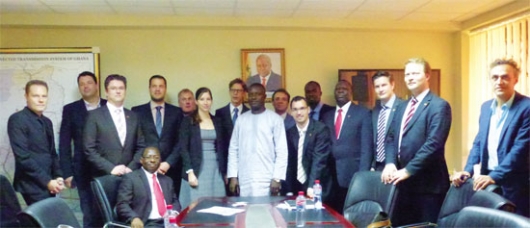Representatives of eight top class German companies with specialisation in renewable energy have completed a week-long working tour of Ghana to ascertain how they can partner local companies to provide grid-connected electricity solutions to bulk consumers in the country.
The high-powered trade delegation on Renewable Energy and Photovoltaic Applications started their mission with a forum on “Grid-Connected PV Plants and applications,” before visiting the Ministry of Energy where they were received by the Deputy Minister of Energy and Petroleum, Mr John Jinapor.
The mission also visited some mining companies, manufacturing companies and other bulk electricity consumers in Tema and Accra.
The visit comes at a time when Ghana is going through power crisis following the shutting down of a component of Takoradi Three power for maintenance. The country currently produces a little over 2,000 megawatts of power, just enough for consumption without any buffer.
Investments into grid connected private power systems have delayed because for a long time the country did not have feed in tariffs which enables such independent power producers to transfer reserve power into the grid.
The Head of Energy Desk at the AHK, Mr Joachim Scheid, told the Daily Graphic that the visit was fruitful as some of the companies had expressed the interest to form joint ventures and partnerships with some local suppliers and companies.
Opportunities in Ghana
Mr Scheid said the coming of the mission was timely because it coincided with adjustments in utility prices to eliminate subsidies, which provide attractive tariffs for investors to recoup their investments.
A research conducted by the Delegation of German Industry and Commerce in Ghana (AHK) revealed that the country offered competitive environment for producing energy from photovoltaic sources (solar energy).
Currently, companies that rely on bulk power buy at 75Gp per kilowatt hour, translating into about 20 Euro cents. However, photovoltaic applications can help them produce power at about eight euro cents per kilowatt hour kWh, or between 40Gp and 45Gp/kWh.
Mr Scheid said members of the delegation were very impressed with their findings on the ground and the potential the country offered them and would want to collaborate with local entities to train more technicians to support the growing PV industry.
AHK organised the mission in collaboration with the German Development Cooperation (GIZ), which recruited the companies on the mission.
Ghana’s energy policy aims at generating 10 per cent of the country’s power needs from renewable sources by 2020. This means PV solutions, hydro power, wind, biomass and other renewable sources of producing power will be harnessed.
Source: Daily Graphic
























